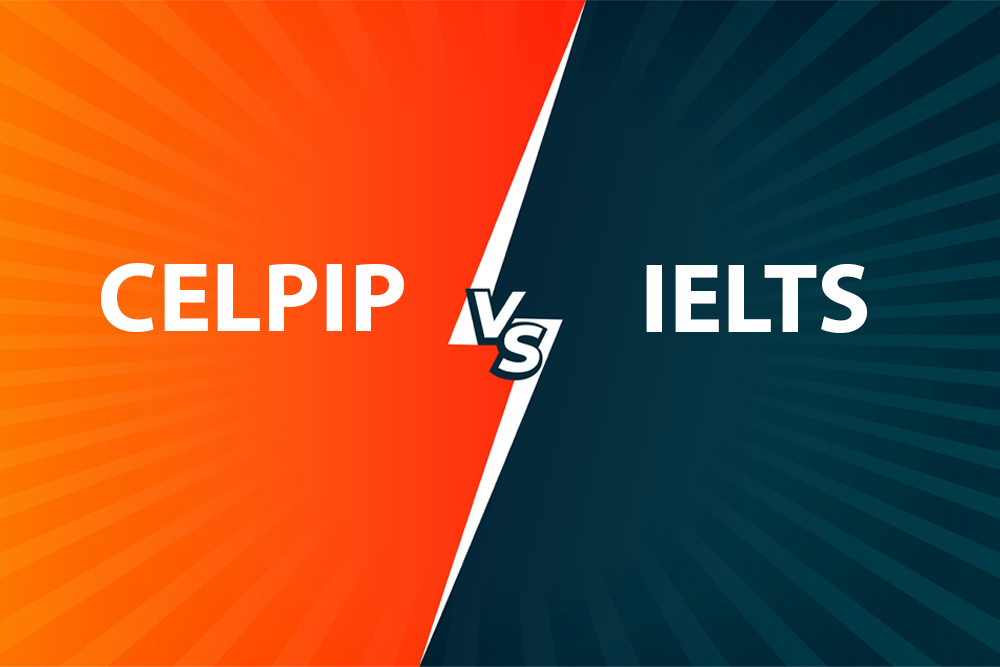Are you planning to pursue higher education abroad but are unsure which English proficiency test to take? With several options available, it’s natural to wonder — which test is easier? Which one can you prepare for and crack quickly?
Many candidates opt for IELTS due to the wide availability of coaching centres in India, while others choose CELPIP as an alternative. In this article, we’ll compare both tests to help you decide which one suits your goals and strengths best.
IELTS vs CELPIP: Understanding the Differences
1. What Do IELTS and CELPIP Stand For?
CELPIP stands for the Canadian English Language Proficiency Index Program, while IELTS refers to the International English Language Testing System.
Both tests are designed to assess the English proficiency of candidates and are commonly required for studying, working, or immigrating abroad.
While IELTS is recognized globally, CELPIP is mainly accepted by Canadian immigration and professional bodies. Understanding their types helps you choose the test best suited for your goals.
Types of IELTS:
-
IELTS Academic – for students applying to universities and higher education.
-
IELTS General Training – for immigration, work experience, or training programs in English-speaking countries.
Types of CELPIP:
-
CELPIP-General – used for immigration and professional designation in Canada.
-
CELPIP-General LS – specifically for citizenship applications, focusing only on Listening and Speaking.
2. Purpose: Global vs Canada-Specific
IELTS is an internationally recognized test used by thousands of universities, employers, and immigration bodies worldwide.
In contrast, CELPIP is primarily designed for candidates planning to move to Canada for education, work, or citizenship purposes.
3. Test Format: Computer-Based vs Face-to-Face Speaking
One of the major differences is the format. CELPIP is a fully computer-based test, including the speaking component, where candidates record their responses using a microphone.
IELTS, on the other hand, includes a face-to-face speaking test with an examiner, which some candidates may find more interactive or intimidating depending on their comfort level.
4. Preparation Materials: Abundance vs Limited Options
IELTS offers a wide variety of preparation resources, including books, online courses, and coaching centres available across India and globally.
CELPIP, however, has fewer study materials, making it more challenging for some candidates to prepare effectively.
5. Recognition: Global vs Canada-Only
IELTS is widely accepted by thousands of institutions, immigration departments, and employers around the world.
CELPIP, however, is only recognized by Canadian immigration authorities and a few institutions within Canada.
6. Language and Accents: Familiar vs Canada-Specific Usage
IELTS includes questions based on American and British English accents, making it easier for students who are already exposed to these varieties.
CELPIP focuses on Canadian English, which includes some unique vocabulary and expressions that may be harder to understand for international students.
IELTS vs CELPIP: Understanding the Differences Between Their Modules
| Module | IELTS | CELPIP |
|---|---|---|
| 1. Listening Modules | The IELTS Listening test lasts for 30 minutes. It includes 4 recordings of native English speakers. The test consists of various question types to assess listening skills in different contexts. | The CELPIP Listening test lasts for about 47 to 55 minutes. It contains multiple parts with a range of questions designed to test how well you understand spoken English in everyday situations. |
| 2. Reading Modules | The IELTS Reading test is 60 minutes long and is divided into 3 parts or passages. A total of 40 questions are asked to evaluate comprehension, inference, and vocabulary skills. | The CELPIP Reading test is 55 to 60 minutes long and consists of several sections. There are a total of 39 questions, focusing on understanding written information in practical settings. |
| 3. Writing Modules | The IELTS Writing test takes 60 minutes to complete and contains two tasks: • Task 1 (Academic): Writing a summary or explanation based on a graph, table, or chart. • Task 1 (General Training): Writing a letter based on a given situation.
• Task 2: Writing an essay for both Academic and General Training versions. |
The CELPIP Writing test takes 53 to 60 minutes and consists of two tasks:
• Writing an email based on a given scenario. • Writing a response to a survey question, explaining opinions or providing suggestions. |
| 4. Speaking Modules | The IELTS Speaking test is conducted in a face-to-face format with an examiner. It lasts between 11 and 14 minutes and is divided into three parts, including personal introduction, discussion, and opinion-based questions. | The CELPIP Speaking test is entirely computer-based where candidates record their answers using a microphone. It lasts between 15 and 20 minutes and includes eight tasks, such as giving advice, expressing opinions, and describing situations. |
CELPIP VS IELTS: Which Test Is Easier to Crack in 2025?
In summary, if you are a student comfortable with British or International English accents, IELTS is likely the better option for you. It offers a familiar format and a wealth of preparation resources to help you succeed.
However, if your goal is to settle in Canada and you’re confident with computer-based tests and have good typing skills, CELPIP could be the right choice. It’s specifically tailored for Canadian immigration and citizenship requirements.
For students and professionals looking for expert guidance, Abroad Gateway is one of the best institutes for IELTS and CELPIP. We provide comprehensive training for both IELTS and CELPIP and also offer personalized support to help you navigate the journey toward studying, working, or settling abroad.






